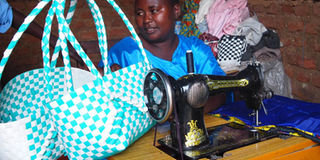ACODEV helps rural poor fight unemployment

Biira, one of the beneficiaries, is now able to pay rent and contribute school fees. Photo BY EPHRAIM KASOZI
What you need to know:
About Acodev. Local NGO also gives guidance of good life skills and choices for both the young people and the elderly.
At 19 years, it is expected that one would still be in school.
Unlike his agemates, the story of Geoffrey Kyahanda, who lost both parents in 2008 is inspirational.
The youth from Kaghorwe village, Nyakiyumbu Sub-county in Bukonzo West, says he managed to attend classes on his own from Primary Two to Six but dropped out due to lack of school fees.
“I stayed home, working as a porter on my elder brothers’ farms until a group of people in our community came registering orphans,” narrates Kyahanda through an interpreter.
The last born among seven siblings describes the coming of volunteers as ‘a blessing’.
“They took me to a skills development centre where I trained as a mechanic and welder and this gave me a job,” says Kyahanda who completed a training programme in welding at the Vocational and Skills Development Center last year.
The centre was started by a charity organisation; Action for Community Development (Acodev) and works to empower individuals, families and communities through innovative solutions.
The solutions involve promoting development as human rights using rights based programming, skills development, HIV and Aids prevention and mitigation, reproductive health and capacity building.
Kyahanda now earns an average of Shs10,000 per day and has since roofed his three roomed house.
“I was a porter until these people (Acodev) picked me from my home which is four kilometers away from here (Bwera town), and gave me the skills I have today. Now I can make metallic windows, and doors depending on the design and job given to me,” Kyahanda says from his workstation at Umoja workshop in Bwera Town.
Another beneficiary, Solonita Biira, a young mother of five from Karuhi village in Karambi Sub-county in Kasese District suffered from poverty until 2012 when she underwent training in tailoring.
“Before joining Acodev, I was engaged in subsistence farming. But after training in tailoring, I acquired skills and hired a sewing machine which I used to carry to community markets. I have since acquired money to rent a shop,” narrates Biira. “I pay rent and I am able to contribute to school fees for my children, feed them and to meet other requirements with the help of my husband.”
Helping the OVC
Kyahanda and Biira are among the 113 young people from 28 districts that have graduated from the centre.
According to Livingstone Bagonza, the Acodev Programme Manager, the skills development initiative seeks to contribute towards the improvement of social economic welfare for the orphaned and vulnerable children (OVC) through tailoring, hairdressing, welding, knitting and computer.
“Through our partners like local leaders, clerics, volunteers, these children are identified and picked from child headed families, vulnerable communities and many are school dropouts. They undergo a holistic integrated programme starting from understanding entrepreneur skills, financial management, human rights, reproductive health and then skills training with knowledge on kitchen gardening for food security,” he says.
Obed Kabanda, the executive director of Acodev, told Jobs and Career the work exhibited by OVCs is an indication of their potential to learn ideas that enable them live economically sustainable livelihoods.
“We are celebrating 10 years of transforming communities in Uganda and succeeding in engaging communities to support psychosocial rights of mothers and children and supporting communities to access and demand social services,” he said.
Acodev is in the process of finalising plans to group the youngsters, put up a youth production centre and to provide young people with startup capital in form of machinery to enable them implement their respective skills acquired.
Kabanda explains that the move seeks to help youngsters establish their own workplaces for self-reliance thereby growing the country’s economic base.
“We work to make the voices of the masses to be heard as well as strengthening the capacity of the structures that are responsible for responding to such voices in the areas of health, education and leadership,” he adds.
HE SAID
“We believe that it is communities who know best the problems they face and as such they are the best actors to solve such problems.”
Obed Kabanda, Acodev executive director




